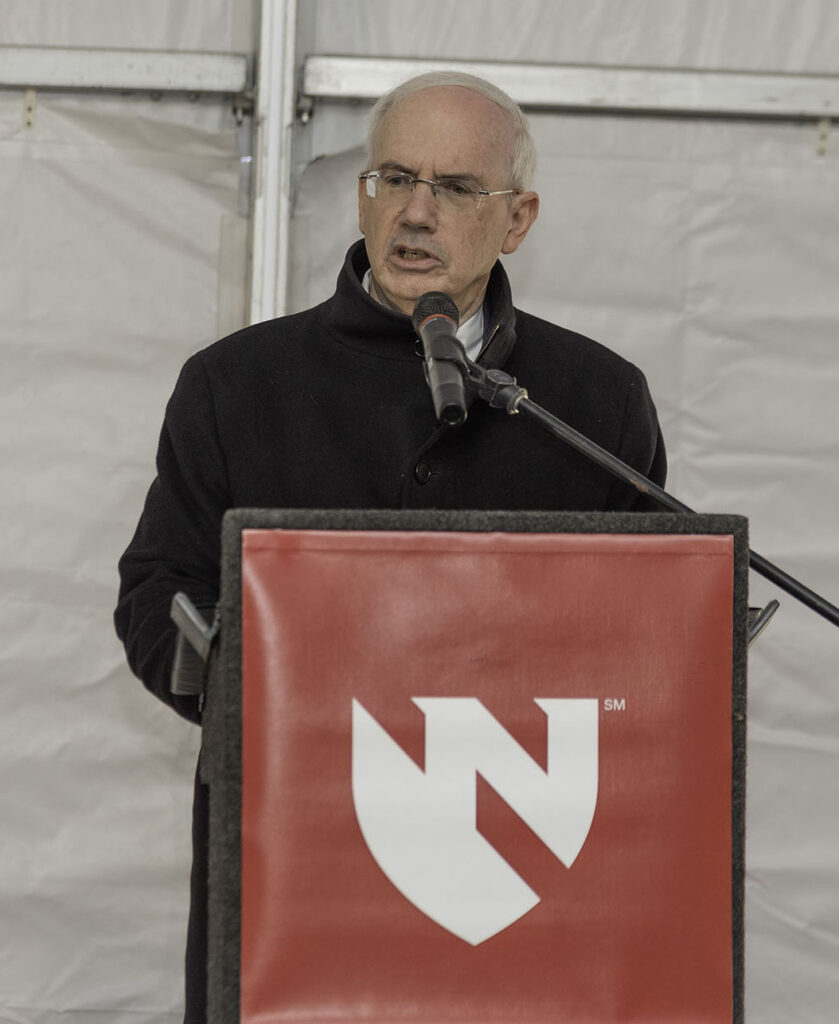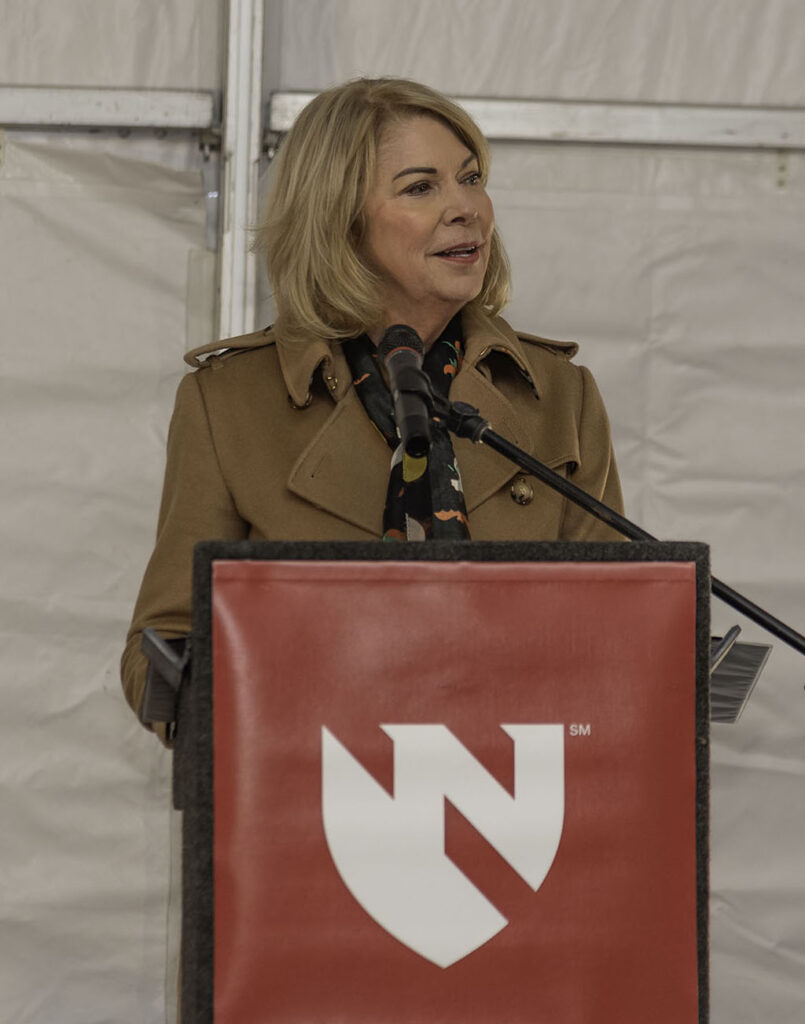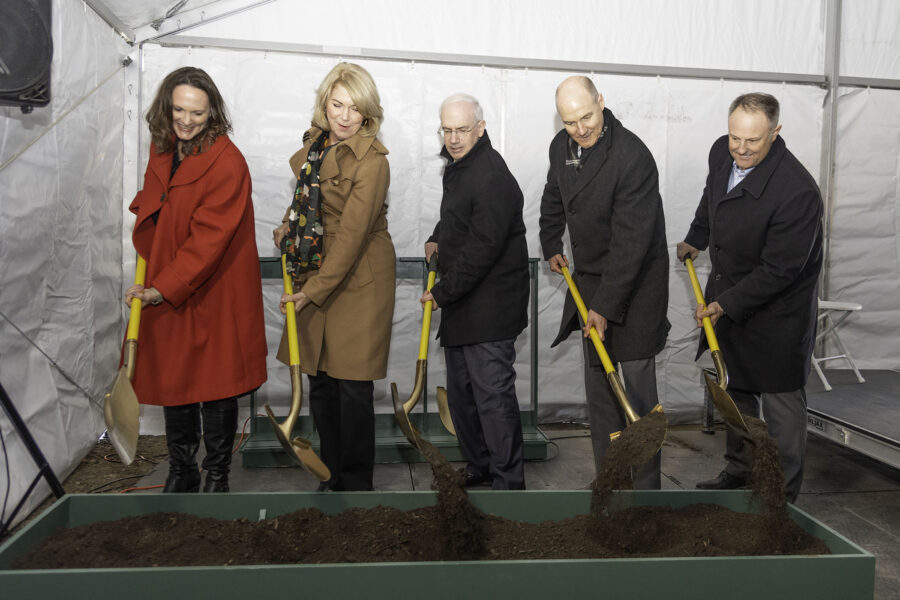Developing biomedical technology is challenging.
And unlike Microsoft and Apple, which started in garages, biomedical companies require space and significant capital for ultracentrifuges, minus-80-degree freezers, autoclaves and fume hoods.
That’s why UNMC Chancellor Jeffrey P. Gold, MD, UNeMed Corporation President and CEO Michael Dixon, PhD, and other UNMC leaders gathered on a brisk Tuesday morning to break ground on the CORE (Campus Operations and Research Excellence) Building.
The facility will support computer-based research and wet lab-based research for drug discovery, oncology research and other strategic research areas at UNMC.
“The development of wet lab space in Omaha is a game changer for us,” Dr. Dixon said, noting that it will spark the creation of startup companies that can grow and develop products.
Already, UNMC and the University of Nebraska at Omaha create more than 100 new inventions every year, he said. “Each of those inventions has the potential to save lives and improve health care, but that only occurs if that technology turns into a product. Chancellor Gold often reminds us that our job as researchers isn’t done until someone benefits from the outcome of that research.”

The CORE Building will serve as the cornerstone of UNMC’s new Saddle Creek Campus at the corner of Saddle Creek Road and Farnam Street. The site also is in proximity to the Catalyst building, now under construction, which will bring together UNMC’s UNeMed and UNeTech branches with biotech and technology startups and make the CORE Building ideal for research that leads to product and drug collaboration and innovation.
“We are bursting at the seams and need to expand our research laboratory space,” said Ken Bayles, PhD, vice chancellor for research. “(CORE) will be a one-of-a-kind facility in the city.”
The project — “indicative of the progress and the momentum our campus continues to see” — also is an economic boost for the city and state, Dr. Gold said.
The CORE Building is being designed to accommodate a future pedestrian bridge structure crossing over Saddle Creek Road, linking the Saddle Creek Campus to the main academic health science campus. The City of Omaha will pay for, own and operate an adjacent parking structure that will serve the building. Completion of the CORE Building is expected in February 2026.
UNMC researcher Rebekah Gundry, PhD, sees great potential with the CORE Building. “As researchers we cannot thrive when we are alone. Our success is often the result of a snowball effect that emerges from the right conditions. When we bring together innovative thinkers with different expertise and provide them with outstanding support in the right space to connect, extraordinary things will happen, and I know the CORE Building will foster extraordinary things that can only happen in Nebraska.”

She knows because she’s seen it happen within the UNMC Center for Heart and Vascular Research, which she directs. The center brings together clinicians and research scientists to do research that leads to the prevention and treatment of heart and vascular disease, the No. 1 killer worldwide, including in Nebraska. As a result, the center has built a one-of-a-kind repository for collecting heart and vascular tissue and blood for research, as well as uncovered new molecules in the heart that can effectively serve as street addresses for delivering therapies to the right place.
These are the first steps, she said, to developing personalized medical approaches and targeted drug delivery pipelines to prevent and treat heart disease. “The next steps require integration with experts in drug development, hence the timing of the CORE space could not be better.”
The groundbreaking exemplifies UNMC’s initiative, experience and commitment to the community, said Omaha Mayor Jean Stothert. “The research and care that will take place here will impact … patients, families and futures.”

Does Core Building replace Admin tower? Where is Admin tower going to be located
Bill – the research functions for the CORE Building were added to the administrative offices at that location. Hence the Campus Operations and Research Excellence (CORE) name.